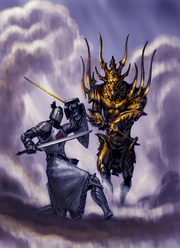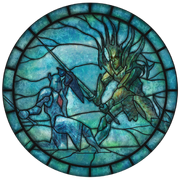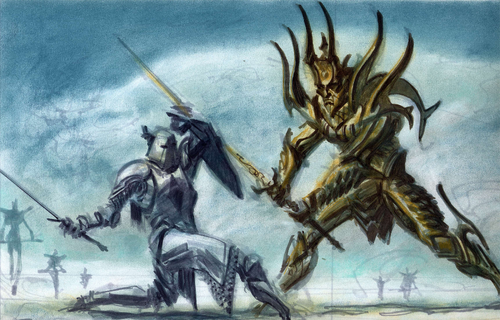Pelinal Whitestrake, renowned as "The Divine Crusader," was an immortal hero, legendary warrior, sorcerer, king, and crusader who fought as champion of the Slave-queen, Alessia.
Origin[]
It is said that Pelinal emerged into Nirn like a Padomaic, carried by Sithis and all other forces of change.[1] Described by Morihaus as an ada or spirit, Pelinal plays the same role as a long line of avatars sent by Shezarr to champion the cause of mankind and stop the Elves from destroying them. Pelinal, however, is an exception, as he exhibits significant bonds to Akatosh as well, as he had the Amulet of Kings in his chest in place of a heart.[1][2]
History[]
Merethic Era[]
Pelinal was said to have first appeared in the late Merethic Era under various aliases where he wandered Tamriel gathering armies, conquering lands, ruling, then abandoning his kingdoms to wander again.[3]
First Era[]
Alessian Rebellion[]

- "These were their eastern chieftains, no longer full of their talking."
- ―Pelinal Whitestrake[src]
Before Alessia started her rebellion in 1E 242, Pelinal had already begun fighting against the Ayleid armies in Cyrodiil. When he heard of her defiance against the Elves, he came to her at a rebel camp holding his mace and sword, both encrusted with smashed Elven intestines, as well as the sacred Ayleid symbols of feathers and pearls, and joined her cause for freedom.[1] As such, Pelinal became champion of Alessia alongside her demiprince lover Morihaus, Breath-of-Kyne.
Crusade[]
In the days of the Rebellion, Pelinal was the enemy of all Elves that lived in Cyrodiil. He did not participate in much traditional warfare, but rather targeted the higher-ranking members of Ayleid culture by challenging them to prearranged duels to play to their pride. One of his more famous duels was with Haromir of Copper and Tea in the duel at the Tor, where Pelinal "ate his neck-veins while screaming praise to Reman, a name that no one knew yet."[4]
Pelinal went on to slay many more Elven rulers in similar duels. He faced another king, Gordhaur the Shaper, and was said to have "smashed his head upon the goat-faced altar of Ninendava," another Ayleid city. Pelinal then cursed Gordhaur's body so that the Ayleid sorcerers would be unable to reanimate their king.[4] Later that season, Pelinal slew the Fire King Hadhuul at the Ayleid city of Ceya-Tar, where his spearmen suffered their first defeat at the hands of the Crusader.[4]
In one year[source?] Pelinal drove the Ayleid armies past the Niben and claimed all the eastern lands for Alessia's forces.[5] He freed the slaves of Vahtacen and the Thousand-Strong of Sedor, a human tribe who had been enslaved by the Ayleids at Sedor.[5] Nothing could stop his march and when he claimed northern Cyrodiil, Alessia sent messengers to the Nords of Skyrim, asking for their aid. When the Nords saw the Crusader standing at the bridge of Heldon, after his white hair had become so stained with blood that it turned brown, they praised him and said that their patron god Shor had returned. Pelinal did not take kindly to that and spat at their feet for profaning that name.[5] Nonetheless, Whitestrake led them west to drive the Ayleids inwards Cyrodiil.[5]
Madness[]
When Huna, a hoplite that Pelinal had trained personally and cared for deeply, was killed by Celethelel the Singer, Pelinal Whitestrake went on his first Madness. He killed without purpose and brought destruction from the cities of Narlemae to Celediil, and destroyed those lands in a rampage, killing any and all who stood in his way.[4] Alessia would have to pray to the Gods for their help, and they reached down to the earth and calmed Pelinal until he stopped his mindless rampage and regained his composure.[2]
Fifd of New Teed said that Whitestrake had no heart under his armor, only the "rage of a mindless dragon."[2] Pelinal was angered by this and would kill anyone who spoke according to the knowledge and logic of the gods, except for Alessia because she "acted rather than talked, as language without effort is a dead witness."[2] When his men heard him say these things, they went silent and angered him. He ran into the rain, laughing madly and swinging his sword, while screaming "O Aka, for our shared madness I do this! I watch you watching me watching back! Umaril dares call us out, for that is how we made him!"[2]
Garid of the Men-of-Ge once witnessed Pelinal's madness in battle. When he and the Crusader had a drink together he asked what it felt like. Pelinal described it as "When the dream no longer needs its dreamer."[2]
Battle with Umaril[]
In 1E 243, towards the end of the war, rebellion forces marched back south and east. When they came closer to White-Gold Tower, the demigod half-Elf Umaril the Unfeathered challenged Pelinal to a duel.[4] At her War Council, the Alessian armies and all of the Nords grew anxious and fearful at the foresight of storming the White-Gold Tower and facing Umaril and his soldiers. Because of their hesitation, Alessia herself counseled delay.[5] Their hesitation made Pelinal furious and made names of his own allies, calling them cowards. He proceeded to insult Umaril in his anger. Outraged and acting on his instinct rather than thought, he went in alone to confront Umaril.[5]
Upon his arrival in the city, Umaril revealed that he had tricked the Crusader and weakened Pelinal by sending in soldiers who he had been saving for this moment, knowing that they would be killed easily by the Crusader.[6] After his battle with Umaril's servants, Pelinal became surrounded by the last Ayleid sorcerer-kings and their minions[6], who were probably summoned Aurorans and other Daedra.[source?] Bleeding in battle for the first time, Pelinal smashed the floor with his weapon in a rage, sending pieces of rock flying in all directions. As his attackers withdrew in fear of their opponent, Pelinal screamed for Umaril to reveal himself and face the Crusader in combat.[6]
It was only after Whitestrake was weakened and badly wounded that Umaril came down to fight him. Both fighters were equally matched, and they injured each other severely.[6] Ultimately, Pelinal broke off the Elf-king's wings, finally killing him and ending the Ayleid enslavement of humans.[6] As his enemy died, Whitestrake yet laughed about the ugliness of Umaril's angel-shaped helmet and recklessly insulted the ancestry of the half-Elf and anyone else who was descended from Old Ehlnofey.[6] Enraged by his remarks about their heritage, the sorcerer-kings returned and overwhelmed the weakened Crusader, killing him.[6]
Pelinal's death[]
- "Our enemies have undone me, Morihaus, and spread my body into hiding. In mockery of divine purpose, the Ayleids cut me into eighths, for they are obsessed with this number."
- ―Pelinal Whitestrake[src]
Pelinal Whitestrake was brutally executed by the remaining Ayleid kings. They surrounded him with their weapons and cut him into eight pieces; a symbolic number in Ayleid culture.[6] Alessia and her council were woken by Pelinal's dying scream and ordered an immediate attack on the city the next morning. The soldiers stormed the walls, looking for more Ayleids to kill, but Pelinal had killed them all except the ones that were already fleeing for their lives.[6]
Fearing for the life of his friend, Morihaus shook the whole tower by bashing it with his horns while he tried to reach Pelinal, but he was too late.[6] In the tower, he found the head of Pelinal Whitestrake, which the kings had left to prove that they had undone one of the cornerstones of the human rebellion. Strangely, Pelinal's head was still alive and greeted Morihaus upon seeing him, much to the shock of the Man-Bull.[6] The two friends spoke for a long time, reportedly about regret and things of which even Alessia herself would never hear the truth.[6]
As the end of his life approached, Pelinal, through forces unknown, realised at the last moment that Umaril survived: "Beware, Morihaus, beware! With the foresight of death I know now that my foe yet lives, bitter knowledge to take to my grave. Better that I had died believing myself the victor. Although cast beyond the doors of night, he will return. Be vigilant! I can no longer shield the host of Men from Umaril's retribution." After this last warning the famous Pelinal Whitestrake died.[7]
Resurrection[]
Strangely it appears that Pelinal was present in 1E 266 at Empress Alessia's deathbed, although he was killed by the Elvish Kings earlier.
- "... and left you to gather strength with my other half, who will bring light to that mortal idea that brings [the Gods'] great joy, that is freedom, which even the Heavens do not truly know, [which is] why our Father, the... [Text lost]... in those first [days/spirits/swirls] before Convention... that which we echoed in our earthly madness. [Let us] now take you Up. We will [show] our true faces to... [which eat] one another in amnesia each Age."
- ―The Song of Pelinal, Book VIII
According to this fragment, Pelinal found salvation after his death, freed of his madness, and now acted as a guardian to bring Alessia's soul to the afterlife. His ghost also appeared to the Hero of Kvatch, the Second Divine Crusader, in order to help them defeat Umaril in the Third Era.[8]
Legacy[]

The stained glass window in the Priory of the Nine.
- "Hail knight! You seek my relics with a worthy heart!"
- ―Pelinal Whitestrake[src]
Pelinal Whitestrake freed Cyrodiil from the Ayleid oppressors and ushered in a new era of peace and freedom. Because of his efforts Alessia could establish the First Empire. His reputation varies widely. Among Imperials, he is a hero who helped free Cyrodiil from oppression. Among Mer, he is the vicious warlord who led the Elven Pogrom. He is also reviled by the Khajiit, because he mistook them for another type of elf and killed many of them before he realized his mistake.[9]
In 3E 111 the Order of the Knights of the Nine was founded with the intent of recovering the lost armor of Pelinal Whitestrake, the Relics of the Crusader.[10] Their reputation was established when the first knights defeated the Wyrm of Elynglenn to recover the Cuirass of the Crusader.[10] The following period was the Order's peak and three more Relics were discovered. However, in 3E 121, during the War of the Red Diamond, the order was split and the Relics were lost again.[10]
"Hail Knight! You seek my Relics with a worthy heart! Your prayers have woken me from my endless dream. Or perhaps you have entered my dream, and I still sleep. I think others have sometimes spoken to me, others like you, but my memory is doubtful. Perhaps the others came after you. Your need must be great for the gods to allow us to speak. Has Umaril the Accursed found a way back? The foulest of a foul race. A thousand curses upon his unholy name! I thought I'd won. But I should have known. The Slavemasters are a cunning breed. Umaril found a way to cheat death, as I could not. If you would seek for my Relics, I know little that can help you. All that has passed since my death is like mist that my mind cannot take hold of. My friends built a shrine upon the site of my death, where the Elves tormented me in a final act of revenge. I can show you where it once stood. Perhaps it is there still. Fare thee well, sir knight. May the gods grant you to destroy Umaril utterly, as I failed to do."
Following Daedric attacks on chapels all across Cyrodiil in 3E 433, the Hero of Kvatch was warned by a Prophet of the fact that Umaril had finally returned to Cyrodiil to unleash his vengeance on humanity for destroying him and his people thousands of years before. After a pilgrimage the Hero received a vision of Pelinal Whitestrake who put them on the path of reconstituting the Order of the Knights of the Nine and reuniting the Crusader's Relics, which were needed to destroy Umaril the Unfeathered forever.[8]
Name[]
Although his true name is never known, Pelinal Whitestrake was referred to in many different ways. Records state that he lived under various aliases, such as Ysmir, Wulfharth, Harrald Hairy Breeks and Hans the Fox. His first name, Pelinal, is a corruption of the name Pelin-El, which means Star-Made Knight. He took the name, despite it being Elven.[11] His last name, Whitestrake, was attributed to him due to his snow white hair. During the Alessian Rebellion, he was known as Pelinal Insurgent, Pelinal the Bloody, Pelinal the Blamer and Pelinal the Third.
This last moniker, 'Pelinal the Third' suggests a relationship with other supernatural champions of mankind — Harrald Hairy-Breeks and Hans the Fox. Altmeri sources suggest that he is one and the same, although it is unlikely that this is the whole story, given his alien characteristics and persona, and the fact that he cannot easily be described as a king or sorcerer. Another theory on his title of "the Third" is that it comes from him being the third vision received by Saint Alessia in her prayers to the gods for mankind's freedom from the Ayleids. Because of his rather vicious crusades against the Ayleids, Pelinal is often referred to as the Divine Crusader by humans.
Personality[]
Pelinal Whitestrake had a very distinct personality compared to other Tamrielic figures. He was known to be very quick to anger, perceiving even the slightest comment as an insult. He would act on instinct and would rarely think about his actions, as shown when he began to mock the Ayleids for their ancestry, leading to his dismemberment at their hands.[6] Another example is when he slaughtered thousands of Khajiit, thinking they were a species of elf. Pelinal was also known to be quite mad, embarking on endeavors of rage and anger, killing any who stood in his path and even destroying the land itself. This madness may have also led him to despise the gods, killing any who "spoke according to their logic."[2] Pelinal was known to be so defiant and short-tempered that he reportedly felt Akatosh looking down on him and simply stared back at him.[2]
Trivia[]
- In The Song of Pelinal, Book III, it is stated that Pelinal deeply loved Huna, whose death by Celethelel the Singer drove him to a crazed destruction spree. Michael Kirkbride said that Pelinal was homosexual, though the direct reference of their intimacy was removed from the final book as it was "a simple matter of keeping his sexuality ambiguous. Since the player was donning Pelinal's armor, completing a mission that he could not, in a sense becoming him, being so blunt about Pelinal's sexuality was too... definitive in relation to the PC's own. Given the open nature of TES PCs, I felt that it was fine to keep it open to interpretation."[UL 1] He later reiterated this comment, saying, "I didn’t decide [to make Pelinal's sexuality ambiguous], Bethesda editors did. As originally written, Huna and Pelinal were lovers."[UL 2]
- Like most male Imperials, Pelinal was voiced by Wes Johnson.
- A soldier named Plontinu believed Pelinal was the Shezarrine and was later smothered to death by moths.[12]
Appearances[]
- The Elder Scrolls III: Morrowind (mentioned only)
- The Elder Scrolls IV: Oblivion (mentioned only)[7]
- The Elder Scrolls V: Skyrim (mentioned only)[4]
- The Elder Scrolls Online (mentioned only)[7]
Sources[]
References[]
- ↑ 1.0 1.1 1.2 The Song of Pelinal, Book II
- ↑ 2.0 2.1 2.2 2.3 2.4 2.5 2.6 2.7 The Song of Pelinal, Book VI
- ↑ Before the Ages of Man
- ↑ 4.0 4.1 4.2 4.3 4.4 4.5 The Song of Pelinal, Book III
- ↑ 5.0 5.1 5.2 5.3 5.4 5.5 The Song of Pelinal, Book IV
- ↑ 6.00 6.01 6.02 6.03 6.04 6.05 6.06 6.07 6.08 6.09 6.10 6.11 6.12 The Song of Pelinal, Book VII
- ↑ 7.0 7.1 7.2 The Adabal-a
- ↑ 8.0 8.1 Events of Knights of the Nine
- ↑ Pocket Guide to the Empire, First Edition: Elsweyr Confederacy
- ↑ 10.0 10.1 10.2 The Knights of the Nine (Book)
- ↑ The Song of Pelinal, Book I
- ↑ The Song of Pelinal, Book V

